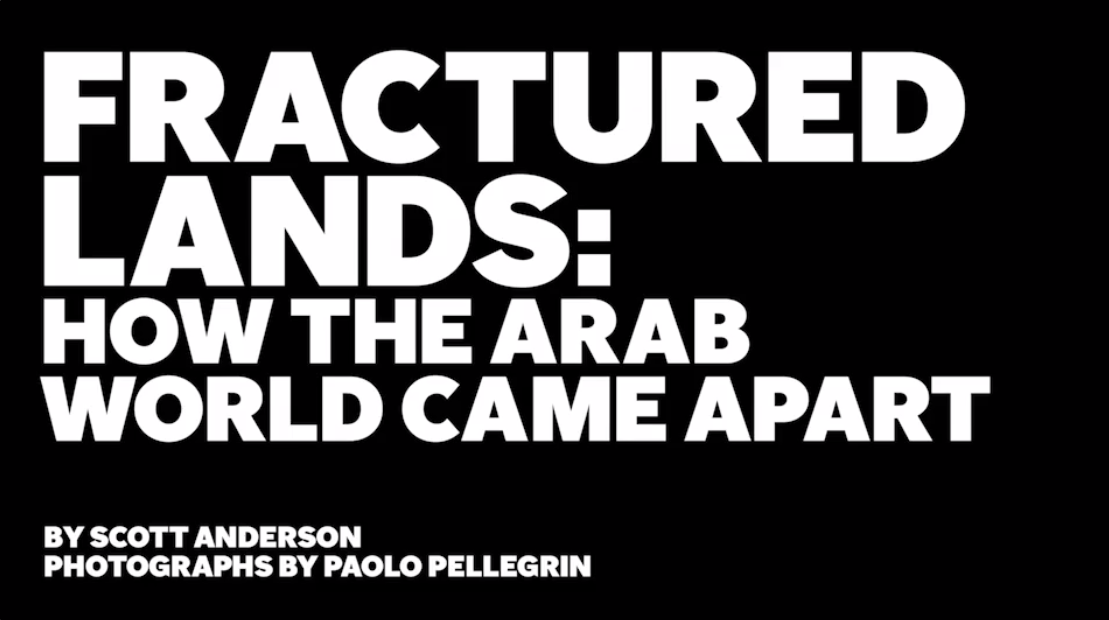The Pulitzer Center on Crisis Reporting is proud to announce its support of the reporting and education initiatives for “Fractured Lands: How the Arab World Came Apart,” the August 14 landmark edition of The New York Times Magazine that is devoted entirely to the reporting of Pulitzer Center grantees Scott Anderson, Paolo Pellegrin and Ben C. Solomon.
In “Fractured Lands,” author Scott Anderson and photographer Paolo Pellegrin use the lives of six ordinary people to provide one of the most comprehensive accounts of how the contemporary Arab world came to be, from “false nations” carved out of the remains of the Ottoman Empire by European powers in the early 20th century to the American invasion of Iraq which set off a chain of events that led to revolution, failed states and the rise of ISIS. The project includes a virtual-reality experience by Ben C. Solomon that transports the viewer to the Iraqi city of Falluja and the heart of the campaign against ISIS. “Fractured Lands” rivals The New York Times’ revolutionary 2012 digital interactive feature, “Snowfall,” in its potential impact on how news outlets tell stories in the digital age.
“We are honored to support these journalists and The New York Times Magazine on this groundbreaking project,” said Jon Sawyer, executive director of the Pulitzer Center. “Few topics are more important. Hardly any have been tackled with the range of storytelling and visual techniques deployed here.”
The Pulitzer Center is also partnering with The New York Times Magazine to provide education resources to help teachers at all levels bring “Fractured Lands” into the classroom. A K-12 lesson plan outlines activities and reflection questions introducing the themes of “Fractured Lands,” comprehension questions for all chapters, discussion questions that encourage analysis of the story’s structure and theme, and a series of extension activities that can be used to further student engagement with the story. A university-level lesson plan, prepared by Elon University School of Communications Associate Professor Glenn Scott, provides guiding questions and activities that deepen analysis of “Fractured Lands” through research and discussion.
The Pulitzer Center education team will bring grantees Scott Anderson, Paolo Pellegrin and Ben C. Solomon to schools and universities around the country this fall, directly connecting students with “Fractured Lands” and the journalists behind this story.
“Educational outreach has always been a core mission of the Pulitzer Center,” Sawyer said, “taking our journalism out to the broadest possible audience and promoting debate on the big global issues that affect us all. ‘Fractured Lands’ will be a vital addition to our online Lesson Builder tools, available to teachers and students throughout the world.”
The Pulitzer Center will host a reception and panel discussion about “Fractured Lands” at Columbia University School of Journalism on Thursday, September 8th at 6 pm. The panel and reception are part of the Pulitzer Prizes Campfires series of events marking the Centennial of the Pulitzer Prizes.
Anderson and Solomon will be joined by The New York Times Magazine editor-in-chief Jake Silverstein. Pulitzer Center Executive Director Jon Sawyer will moderate the discussion, focusing on the substance of the reporting, the journalistic uses of new techniques such as virtual reality, and The Times' commitment to making the magazine a platform for high-impact reporting.
"The magazine's vision for this issue aligned with one of our core goals," said Nathalie Applewhite, the Pulitzer Center’s managing director, "to raise awareness of the underlying causes of crises that make the headlines but too often without the depth of context this story delivers."
The Pulitzer Center is a nonprofit journalism organization that promotes in-depth engagement with global affairs through its support for quality international journalism across all media platforms and an innovative program of outreach and education.
The Pulitzer Center supported “Fractured Lands” through its Catalyst Fund, an initiative aimed at fostering strategic partnerships between the Center and major news outlets to support work by freelance multimedia journalists on global issues. The Catalyst Fund was begun with support from the John D. and Catherine T. MacArthur Foundation, the Kendeda Fund, and individual donors to the Pulitzer Center.
For more information about the Pulitzer Center’s support of “Fractured Lands,” or to schedule an interview, please contact Jeff Barrus phone at 202.460.4710, or via email at [email protected].
